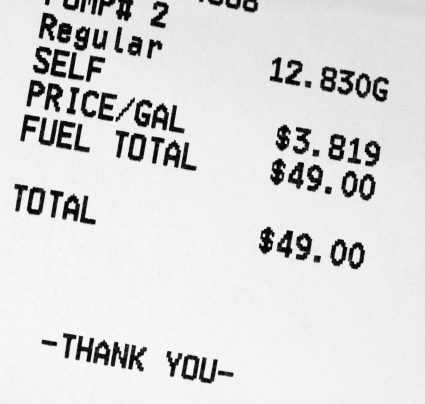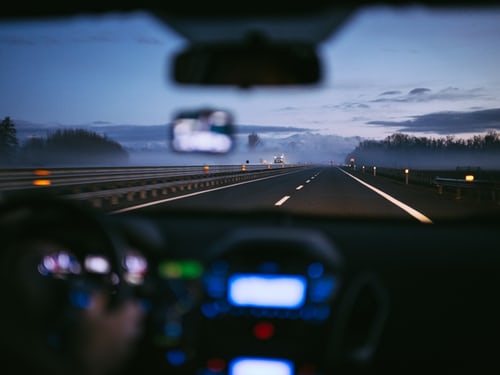Self-employment and the gig economy
What you need to know to be a successful food delivery driver on DoorDash, UberEats, Grubhub and Instacart Shopper
Yes there are other services but we'll just talk about the food delivery game here. If you are in this industry or interested in it, you have to know a few things upfront.
You already know you're self-employed, correct? At least for tax purposes but we'll get to that later.
So what does it take to keep making money in a volatile industry like the gig economy, specifically food delivery?
The food delivery industry is not like any other industry where you have a boss or coworkers. It's just you against the clock. No one lurking over your shoulder but also no one holding your hand.
You're on your own: You're literally self-employed!
Freedom and flexibility sound good until you get out on your own with virtually no guidance. Who would have guessed that the simple act of driving to a restaurant, picking up an order and delivering it to a customer could have so many pitfalls?
Or going to the grocery store and shopping for a person other than myself? How hard could it be? Well, not that hard and you'll figure those things out by completing orders but there are some overall things you need to remember.
Just know that you're mostly on your own. Remember, how I already mentioned self-employment? Yep. You're self-employed so it'll take a certain amount of discipline.
Yes, you'v essentially your own boss and get to decide when you work (well, it does depend on availability of orders but there is a lot of freedom, no doubt). You have to have a certain level of discipline to go out even when no one is watching over your shoulder.
Again, there's freedom here. If you're a night owl, you can go out at night and make good money. I can barely find house numbers during the day so I stick to daylight hours
Self-employment taxes are insane!

Yes self-employment means you's on the hook for taxes just like you would if you had your own business. So keep your gas receipts and track your mileage. I recommend getting an app that helps you keep track of both.
I've used a couple of different apps over the years. Stride is free and Everlance is paid. It has a few additional features I like better than Stride.
Either way, if you forgot to keep track of your mileage and gas receipt, you'll end up owing thousands more than you needed to. Yes, you heard that correctly, thousands of dollars.
This is the part many people like to skip over but I have a whole page dedicated to tax info for 1099 (that's you). Check it out here.
Since I wrote the tax guide, I will not go into too much detail here but let me just give you a quick tax tip:
Aside from keeping your gas receipts and tracking your mileage, I recommend you squirrel some money away each week so you're not left stranded when you owe come tax season (and you'll most likely owe - I owed over $2,000 last year).
Here's how to squirrel away money each week:
Each app except Grubhub and Instacart allows you to add a debit card that goes into your bank account associated with that debit card for cash out on a daily basis (for a fee) and a direct deposit bank account for weekly deposits (no fee).
Just have two different bank accounts so one can be for all your regular expenses and one can be more of a savings account so you're not screwed when tax season rolls around. Link one to your daily cash out and one to your weekly pay.
Can anyone be a food delivery driver or Instacart Shopper?
Let me address a question I've been asked before: Who can be a food delivery driver or shopper?
Anyone who knows how to use a smart phone, has a car, can pass a relatively basic background check and does not mind being on their own without much guidance.
I've talked to people from all kinds of backgrounds and ages so if you're wondering if this is for you or if you's too old, too short, too whatever ... You're not.
I'm not ancient but I'm no spring chicken (Hello high school sweetheart Windows 98) and I've talked to people 10+ years younger and 20+ years older than me who are doing this successfully full-time and part-time . And no, the market is not too saturated, people come in a
Many people I know do this as their main gig with maybe other gigs outside of the delivery game. Others have a day job and just go out in the evenings and weekends for extra cash. I recently met a schoolteacher who wanted to do something during his summer off, so he decided to do UberEats because a friend sent him a referral link. The friend got $200 extra after he completed 100 deliveries so that was an extra bonus.
If you actually like the structure of an office, this is not for you but if you like to just sign on to an app and get to work, this is for you.
It just takes a certain mindset so let's take a look at a few things I've learned doing this for a few thousand orders across apps.
Just get on the road and get that first order out of the way!

I know one of the biggest fears people have is that they accidentally accept an order and are on the hook for delivery. Maybe you signed up and you do not really know what to expect so you keep putting off that first order out of fear. You spend a while looking at the app but you never really hit go.
If you want to see what it looks like on each app when you're getting started, take a look here: DoorDash, UberEats, Grubhub, Instacart
If you're looking for a comprehensive comparison of each app from a delivery driver point of view (aka, moi!), check it out here.
Getting over that initial hurdle prevents many from making the extra cash they need.
First of all, let me tell you that most of the apps except Grubhub make it insanely easy to drop an order if you accepted something that's not a good fit (hint: always select "Pay too low" on Grubhub so you do not have to call their support).
However, I also recommend you just take that order because in this industry, you learn by doing. And sometimes you have to do an order that sucks to know what to look out for in future orders.
I remember I was hesitant to go out for my first Instacart batch. I drove around all day just to get one order and was so exhausted by the time I got home and I had only made $ 18 (Don't believe me? Look at the screenshot!
I thought I would not be able to do this based on that first order and week but I ended up kicking butt and making between $ 750- $ 1,000 a week consistently. This is something I could not have anticipated when I first signed up in 2019 and based on my first day.!
My first week on DoorDash and UberEats, and Grubhub was similarly disappointing because it took some time to get oriented. I knew all the stores for Instacart but had no idea which restaurants were good for DoorDash and which to avoid.
Do not give up. The first few orders are not representative of your future experience, although of course there will be challenges along the way (here are some of my stories).
Be flexible

The gig economy is volatile, it can depend on the time of day, week or season so it's important to stay flexible and not get bogged down by planning.
Yes, you need some of an earnings strategy, yes you need to know how far you are willing to travel for an order. B ut you also have to be super flexible when it comes to going out when it's busy.
Each app provides feedback on when they think it's going to be busy; however, trust me when I say there were random rainy Mondays that were predicted to be low and all of a sudden it was very busy because of rain or snow or thunderstorms, etc. so I decided to go out and those Mondays were some of my most lucrative days.
Master unexpected situations
I've encountered some unexpected situations with angry dogs, shady neighborhoods and unavailable customers but overall, I've had a pretty smooth run. It's a bit about your attitude that determines what you'll encounter during your time as a gig economist. The people I know that are inherently grumpy and prone to things going wrong, usually encounter bad situations that make them even grumpier. I am generally just so thankful that I do not have to go into an office everyday, I do not let bad situations bring me down.
Any situation can help us learn and grow so do not be so quick to blame a restaurant or customer for a bad experience, just acknowledge it happened and move on.
Shake it off
At times, his job is like any other where you'll deal with not so nice people and sometimes you are the not so nice person.
But unlike other jobs where you'll have to face the same people every day, with this job it's the once in a while customer who you'll likely never see again (ahem, probably because you should remember their name and drop their order should you ever get them again) that really irks you.
Chances are they'll have forgotten you as quickly as you forget them. I know, I emphasize the importance of customer service but letting stuff go is also important. I worked at a desk job for a decade so trust me when I say that this is a cake walk compared to office politics.
You're in the customer service industry
Driving to restaurants and stores does not seem to require much but it does require some basic skills, mainly multitasking, attention to detail and customer service skills.
As I describe in my Instacart segment the dos and don'ts of being an Instacart Shopper (check that out here) and the dos and don'ts of the food delivery game (check it out here) , food delivery, is very much about customer service. Let's be honest, the base pay on these apps is ridiculous so who do you depend on to make most of your money? The customer.
I've had some insane tip increases on Instacart and UberEats, just because I paid attention to detail (ie I did not buy rotten lettuce on Instacart and double checked for a missing drink order on UberEats - not exactly rocket science).
If I run into a customer during delivery, I am polite and do not just look down at my phone to get it over with. Yes thankfully, lots of customers prefer to be left alone and choose the leave at door option but that does not mean they will not notice speedy, accurate delivery.
So what I'm trying to say here is that a lot of your money depends on your customer service skills so don't be a DoorDouche and have some basic customer service skills even if no boss is watching you.
If you're into Instacart, check out what customers want you to know based on my experience shopping 1,000+ orders on the platform and interacting with dozens of customers.
And that's it folks, hopefully you understand what being a self-employed gig economist entails and you're ready to hit the road.